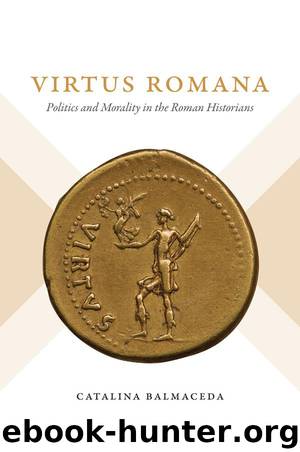Virtus Romana by Catalina Balmaceda

Author:Catalina Balmaceda [Catalina Balmaceda]
Language: eng
Format: epub
THE RECORD OF VIRTUS in Velleius’ Historiae could be seen as an answer to that of previous historians. For Sallust and, to a certain extent, Livy, virtus in Rome had had its day. Sallust seemed keener to denounce the lack of virtus toward the end of the republic and registered only a few examples of men of virtus. Livy, on the other hand, presented a long chain of deeds of virtus, but placed them far back in time. It was in the glorious past of the republic where they saw virtus realized. Virtus for them was inseparably associated with the republic: the decline of this latter had inevitably implied the decline of virtus. Velleius’ interpretation is more positive. The period of decline had been left behind, and Rome had passed the test successfully: the Roman state, identified with its ruler the emperor, was again a stage for virtus. The example of its head promoted and encouraged virtus in the whole of the Roman people.
Virtus—with its double meaning of courage and virtue, and also in the plural, virtutes—is for Velleius the unifying link in the development of this succession. It is absolutely necessary to reinforce this concept after the vicissitudes of the previous age. Virtus was somehow hidden during the late republic, only shining out every now and then in individual cases. Now, when peace is spread throughout the empire and its head is a model of virtus, Romans—aristocrats and homines novi—can practice it openly and without fear. Even though the term was used from one century to the next, and the meaning was somehow altered by different generations, virtus was not worn out: the concept had an emotional power that went beyond transient aspects. If Velleius emphasized the coming of a new and better era, his writings show us that it was better precisely because people could live according to the mores maiorum. Hence his stress on the recovery: revocata in forum fides … Restitution and novelty: Velleius restores the belief of the empire as a place where virtus could reign, and at the same time he helps to consolidate the ways in which autocracy was going to be seen and shaped henceforward. Rome has recovered her essence, and history can continue advancing to perfection.
Download
This site does not store any files on its server. We only index and link to content provided by other sites. Please contact the content providers to delete copyright contents if any and email us, we'll remove relevant links or contents immediately.
| Archaeology | Essays |
| Historical Geography | Historical Maps |
| Historiography | Reference |
| Study & Teaching |
Underground: A Human History of the Worlds Beneath Our Feet by Will Hunt(12084)
Sapiens by Yuval Noah Harari(5363)
Navigation and Map Reading by K Andrew(5150)
The Sympathizer by Viet Thanh Nguyen(4383)
Barron's AP Biology by Goldberg M.S. Deborah T(4141)
5 Steps to a 5 AP U.S. History, 2010-2011 Edition (5 Steps to a 5 on the Advanced Placement Examinations Series) by Armstrong Stephen(3723)
Three Women by Lisa Taddeo(3421)
Water by Ian Miller(3176)
The Comedians: Drunks, Thieves, Scoundrels, and the History of American Comedy by Nesteroff Kliph(3066)
Drugs Unlimited by Mike Power(2590)
A Short History of Drunkenness by Forsyth Mark(2286)
DarkMarket by Misha Glenny(2206)
The House of Government by Slezkine Yuri(2190)
And the Band Played On by Randy Shilts(2189)
The Library Book by Susan Orlean(2063)
Revived (Cat Patrick) by Cat Patrick(1987)
The Woman Who Smashed Codes by Jason Fagone(1967)
The Absolutely True Diary of a Part-Time Indian by Sherman Alexie(1899)
Birth by Tina Cassidy(1899)
